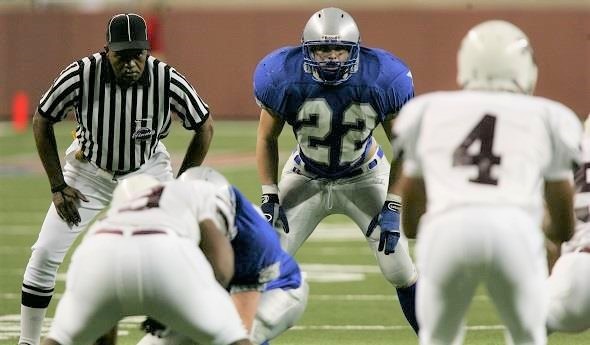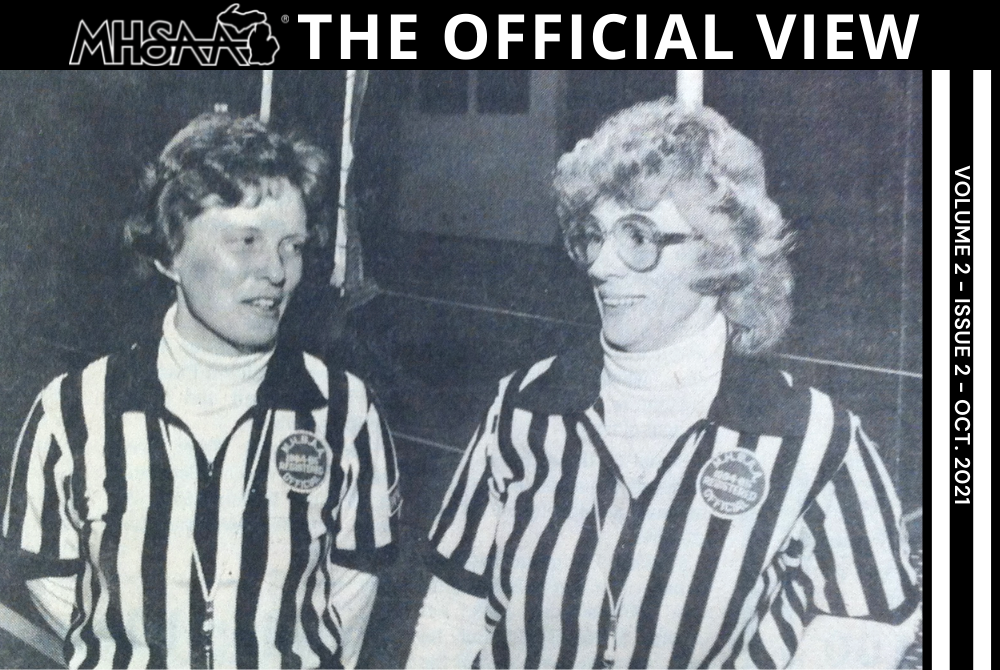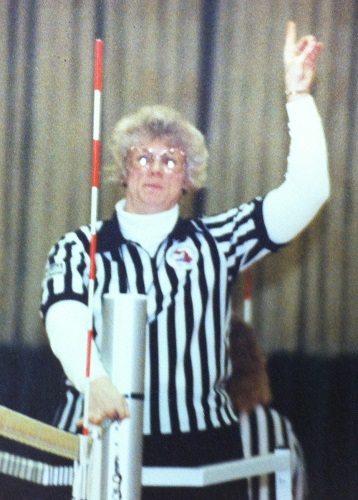
Norris Winner Jewell an Officiating Gem
April 8, 2014
By Geoff Kimmerly
Second Half editor
When Hugh Jewell looks at the list of past Vern L. Norris Award winners, his eyes are drawn to 1992 honoree Ted Wilson of East Detroit and Redford’s Bob Williams, who earned the Michigan High School Athletic Association officials accolade in 2011.
Both rank highly among those who have mentored Jewell, a 40-year MHSAA official who has worked a combined eight Boys Basketball and Football Finals.
Wilson and Williams also are the only past winners from the Detroit area. And that makes Jewell even more honored to become the third.
 A member of Halls of Fame for both the Detroit Public School and Detroit Catholic High School Leagues, Jewell will receive this year’s Norris Award at the Officials’ Awards & Alumni Banquet on May 3 at the Kellogg Center in East Lansing.
A member of Halls of Fame for both the Detroit Public School and Detroit Catholic High School Leagues, Jewell will receive this year’s Norris Award at the Officials’ Awards & Alumni Banquet on May 3 at the Kellogg Center in East Lansing.
Receiving the call to accept this year’s Norris Award led Jewell to recall many who have helped him along the way – and make a day’s worth of phone calls thanking them for the opportunities and knowledge.
“I’ll never forget certain people who saw something in me even back then, in the 1970s and early 80s, when I was getting on my feet,” Jewell said. “Especially as you get older in this, you have to take on the mentality that whatever it is you learned over the years, there’s reason to give back and pass it to younger (officials).
“Now, reaching the point that I have, I think that’s why a lot of younger guys look forward to games (with me). They see my name, and they know I’m going to give them something to take home with them, even if it’s nothing more than a little bit of advice.”
The Norris Award is presented annually to a veteran official who has been active in a local officials association, has mentored other officials, and has been involved in officials’ education. It is named for Vern L. Norris, who served as executive director of the MHSAA from 1978-86 and was well-respected by officials on the state and national levels.
Jewell, 65, has worked mostly in football, boys and girls basketball, and also a few seasons of volleyball and softball. He also officiated college basketball for more than 20 years, reaching the Division II level.
Jewell officiated MHSAA Boys Basketball Finals in 1986, 1989, 1990 and 1997, and Football Finals in 1991, 1995, 2000 and 2006 in addition to a number of Semifinals and earlier-round tournament games.
Not only have his Finals come in three decades, but Jewell believes he is the only official to work MHSAA Basketball Finals at Crisler Arena, The Palace of Auburn Hills and the Breslin Center. He also began his championship weekend run with a 1986 Class A Semifinal at Jenison Field House.
“He has taken advantage of every opportunity to improve himself in his field,” wrote Alvin Ward, a longtime Detroit teacher, coach and administrator and the PSL’s executive director of athletics, in his nomination of Jewell for the Norris Award. “His always positive personality and strong leadership skills have enabled him to become the respected mentor to all who came in contact with him during his prestigious career.”
Jewell graduated from Highland Park High School in 1966 and was decorated with the Combat Infantryman Badge, Bronze Star with Valor Award, Air Medal Award and Vietnam Campaign Ribbon while serving in the U.S. Army from 1968-70.
Jewell then served as a Highland Park police officer from 1970-78, receiving numerous unit and individual citations, and continued as a police/liaison and security officer at the high school and adjoining community college and adult education center.
Jewell earned a bachelor’s degree in secondary education from Wayne State University in 1979 and took his dedication into the classroom two decades later after earning a teaching certificate in social studies in 2001. He taught from 2001-04 at Highland Park Alternative High School, 2004-06 at the Wayne County Juvenile Detention Center’s Ben Carson Academy and from 2006-10 at the Life Skills Center of Metro Detroit.
He has mentored countless sports officials, students and coaches at Detroit area community and neighborhood centers, and taught volunteer officiating classes at Highland Park Community College from 1980-88.
“Hugh Jewell is renowned not only as a top official who has worked a number of Finals events, but also as a positive influence in the officiating community, “ MHSAA Executive Director John E. “Jack” Roberts said. “He’s passed on his expertise to countless colleagues, students and coaches as a clinician and mentor for more than three decades. We are pleased to recognize Hugh Jewell with the Vern L. Norris Award.”
Jewell also is a member of the Basketball Coaches Association of Michigan and Highland Park Community High School Halls of Fame, and has been an active member of his church and the Highland Park Men’s Forum. In addition to multiple Detroit area officials organizations including the Metro Detroit Officials Association, Jewell is a member of the NAACP and American Federation of Teachers.
He also has served as deputy director of the city of Highland Park’s Parks and Recreation Department, deputy superintendent of the city’s Water & Public Works Department and as a substitute teacher/security specialist for Southfield Public Schools.
In addition to passing along his knowledge of games, Jewell had made sure to create a comfort zone for newer officials – remembering when another veteran did the same for him.
Before tip-off of that 1986 Semifinal at Jenison, official Stan Kemp told his young partner, “Don’t worry about a thing. We’ve got this,” Jewell recalled, and Jewell still appreciates how that put him at ease. (Jewell also remembers Kemp mentioning that will a little luck Kemp might be in the NFL someday – and then turning on a game that fall and seeing him wearing the white hat.)
Other best memories include packed Quarterfinals at the University of Detroit Mercy’s Calihan Hall and Ferndale High School – which over the last 30 years have often hosted matchups of the best Class A teams from the Detroit area as they made bids to reach the MHSAA championship-deciding weekend.
Jewell has helped a number of officials prepare for their first “big games.” He delighted in watching one, Lamont Simpson, work an NCAA Tournament game just a few weeks ago. It’s those relationships, part of an incredible legacy, and the opportunities to pass on lessons learned, that have made officiating a giant part of his life’s work.
“Whether it’s in the pregame conference or postgame chit-chat, I have that responsibility to pass those things on,” Jewell said. “I love hearing (from those officials). That why we stay doing this 30 or 40 years.”
Previous recipients of the Norris Award
1992 – Ted Wilson, East Detroit
1993 – Fred Briggs, Burton
1994 – Joe Brodie, Flat Rock
1995 – Jim Massar, Flint
1996 – Jim Lamoreaux, St. Ignace
1997 – Ken Myllyla, Escanaba
1998 – Blake Hagman, Kalamazoo
1999 – Richard Kalahar, Jackson
2000 – Barb Beckett, Traverse City; Karl Newingham, Bay City
2001 – Herb Lipschultz, Kalamazoo
2002 – Robert Scholie, Hancock
2003 – Ron Nagy, Hazel Park
2004 – Carl Van Heck, Grand Rapids
2005 – Bruce Moss, Alma
2006 – Jeanne Skinner, Grand Rapids
2007 – Terry Wakeley, Grayling
2008 – Will Lynch, Honor
2009 – James Danhoff, Richland
2010 – John Juday Sr., Petoskey
2011 – Robert Williams, Redford
2012 – Lyle Berry, Rockford
2013 – Tom Minter, Okemos
High school game officials with 20, 30, 40, 45 and 50 years of service also will be honored at the Officials’ Awards & Alumni Banquet on May 3. Eight officials with 50 or more years of service will be honored, along with 14 officials with 45 years. A 40-year award will be presented to 74 officials. In addition, 92 officials with 30 years and 183 officials with 20 years of experience will be honored. With the induction of this year’s group of 371, the honor roll of officials who have aided young student-athletes grows to 9,416 since the inception of the banquet in 1980. Click to see the full list of this year’s honorees.
Tickets for the banquet are available to the public and priced at $20. They will not be sold at the door. Tickets can be ordered by calling the MHSAA office at (517) 332-5046 or by sending the order form available at this link.
PHOTO: Hugh Jewell officiates the 2006 MHSAA Division 6 Football Final between Inkster and Saginaw Nouvel at Ford Field. VIDEO: Jewell, in 1988, speaks about officiating while working an MHSAA camp.

The Official View: Title IX – Door Opens for Female Officials
By
Brent Rice
MHSAA Assistant Director
October 29, 2021
In the 50 years since Congress passed Title IX legislation in order to create equal educational opportunities, huge strides have been made for female students to participate in athletics.
But the advancement of opportunities wasn’t just for the athletes. It also opened a door which ushered in a generation of female sports officials.
Betty Near is one of those officials whose long and distinguished career as a high school and collegiate volleyball official is a direct result of the opportunities provided through Title IX. Unlike many today who entered officiating after having played the sport, Betty didn’t have those opportunities before first climbing the ladder (literally) in 1971. She was encouraged to take up the sport by Macia Tiesenga (a nationally-ranked collegiate official) who told Betty – who had been involved in athletics recreationally – that athletes make the best officials because of their understanding of competition.
“I’m frequently asked whether I got into officiating because I played volleyball. I tell them I didn’t play because girls volleyball didn’t exist when I was in school," Near said. "I try to share the story of Title IX every chance I get, to show them that they now have opportunities to both play and officiate because of those that came before them.”
Near has spent more than 45 years as a registered MHSAA official and is still going strong. That run has included six appearances as a Finals official. She recalls how at one of those Finals, an injury to her knee created a change in mechanics for the entire state.
“When I first began officiating in the 70s, the MHSAA had the umpires (R2s today) kneel underneath the net to look at blockers," she said. "This was quite dangerous and pretty ineffective.
"Officiating at the collegiate level, I had been trained to stand at the pole and look down the net. With this background, and seeing as my knee was still hurting from an earlier injury, I decided to use this mechanic.”
 Sue Martin, the MHSAA director for volleyball at the time, approached Betty following her match. Near was certain that she was going to receive an earful. Instead, Martin asked the justification for using the mechanic, and they discussed the pros and cons of each. It was ultimately decided moving forward the umpire would take a position standing at the pole.
Sue Martin, the MHSAA director for volleyball at the time, approached Betty following her match. Near was certain that she was going to receive an earful. Instead, Martin asked the justification for using the mechanic, and they discussed the pros and cons of each. It was ultimately decided moving forward the umpire would take a position standing at the pole.
Mechanics changes aren’t the only effect Near has had on the sport. She was instrumental in the start of the West Michigan Volleyball Officials Association in 1984 and continues to help lead and grow that organization (now with more than 125 members). This has allowed her to work with the community, raising nearly $125,000 for scholarships for graduating high school seniors. And one of her biggest contributions remains her role in recruiting and mentoring new officials – especially helping to develop the next generation of female officials.
“Mentoring is a gratifying thing,” said Near, “especially when I receive emails or calls thanking me for helping them understand specific rules or situations and improving their skill sets. Watching someone I have mentored over 20 years work her way up to officiate multiple state tournaments (pleases me).”
Now officiating primarily at the college level, Betty still reserves Thursdays during the season to officiate MHSAA contests. She does this for the purpose of staying connected to high school students and officials and to build on the growth of female registered officials, though she also recognizes that challenges remain for female officials advancing through the system.
One of the natural barriers that apply to women more often than men is that women who begin families sometimes find difficulties continuing to officiate with their other responsibilities. While home lives can be difficult to navigate (for both women and men), officiating school sports provides a flexible alternative to stay active, remain involved in athletics, give back to the community, develop camaraderie and earn some extra cash.
Another hurdle that Near identifies for female officials, unfortunately, is a continuation of the “good ol' boy network.” She is reminded of a not-so-distant-past example when she and another female official had been selected to officiate the Regional round of the MHSAA Tournament; and even though both were well-established collegiate officials the host athletic director insisted that less-experienced male officials work as the R1 and R2 and the women work as line judges because the men would have better control of the tough matchup.
Of course, that kind of mindset isn’t based in fact, and many of the MHSAA’s best officials in all sports are women. Especially in girls sports, it is important that the student athletes see officials who represent them; but the MHSAA seeks female officials in all sports, including those dominated by male participants. This year will once again include a female officiating in the MHSAA Football Finals. Female officials also have worked Finals in baseball, boys basketball, ice hockey and wrestling.
The door that was opened for women and girls with the passing of Title IX a half-century ago only provides the opportunity. Capitalizing still requires stepping through the door to take full advantage of the opportunities provided. Near wants to encourage anyone to join the avocation of officiating, but especially young women.
“My hook is that the officiating is fun, and it is an activity that can be an avocation that can pay (in many ways) throughout their lifetimes," she said.
It’s Official!
Postseason Assignments: Officials assignments for fall sports tournaments have been released. Congratulations to all selected to officiate this year.
Speaking of tournament assignments, a change will be made this year that allows basketball officials to submit their availability to work together as a crew. Crews can be set for the boys and girls tournaments separately. The hope is that this will encourage more officials to seek postseason consideration, knowing they can choose with whom they will officiate. Eligible individuals not included with a crew will be assigned a crew by MHSAA staff.
For all winter sports officials, make sure to complete all requirements for postseason consideration. Please remember that officials in basketball, competitive cheer, gymnastics, ice hockey and wrestling must opt-in to the tournament by indicating their tournament availability dates HERE. All additional requirements such as completion of tournament exams and submission of regular-season schedule also remain in place.
Officials Review Committee: The Officials Review Committee, consisting of school administrators, officials and assigners from around the state, convened in early October to discuss issues and concerns involving officiating. A number of proposals were made to the MHSAA Representative Council. You can find these and other discussion items by reviewing the minutes HERE.
Know Your Rules
SOCCER A player (#7) is injured and must leave the field. His team elects to play short-handed. If #7 heals up, when can he return to the field? What if they wish to replace him with #12?
RULING If #7 comes back into the game, he only needs to wait until the next stoppage of play. If he will be replaced by #12 though, #12 can enter the game only at the next legal substitution opportunity.
It’s Your Call
REVIEW Last month’s play involved a suspect block by a defensive player (found here). The block by B17 is correctly flagged for an illegal block below the waist. While not widely known by spectators, blocks below the waist (except for linemen immediately at the snap) are illegal for players on both sides of the ball. In this case, since the block was by the defense, the penalty is enforced 15 yards from the end of the run.
VOLLEYBALL Officiating ball handling is the topic of this month’s "It’s Your Call." This rally ends following the pass of a back-row player. What’s the call?

